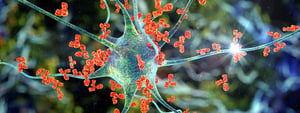Do schizophrenia and other forms of psychosis have an autoimmune component? In other words, are they caused by errors in the immune system that attack nerve cells (instead of defending them), create damage, inflammation and also lead to changes in perception?
The idea that the origin of several psychiatric disorders was to be found somewhere that no one had ever looked (thus revolutionizing the classical theories on mental problems) has been gaining ground for some time. It has also led to significant discoveries in other fields linked to neurological diseases, for example, two years ago an international team of researchers discovered that narcolepsy, a sleep disorder, has an unexpected autoimmune origin (the results of this major study were published in the journal Nature).
Now, on the other hand, neurologists from the University of Barcelona are focusing on a disease with a difficult name – anti-NMDAR encephalitis – which causes symptoms that in some ways overlap with those of schizophrenia and also has a certain autoimmune origin. In practice, this disease is caused by autoantibodies, i.e. by antibodies that target the organism itself, attacking specific proteins placed on the surface of nerve cells (in technical terms known as NMDA receptors, which stands for N-Methyl D-Aspartate).
As reported in the scientific journal Annals of Neurology, the Spanish researchers took small amounts of cerebrospinal fluid (found around the brain and spinal cord) of patients suffering from anti-NMDAR encephalitis and by using sophisticated techniques they extracted the autoantibodies found in this fluid. They then selected, purified and administered them to laboratory animals, which soon developed symptoms similar to those of encephalitis (reversible symptoms, however, when the autoantibodies were no longer used by the researchers). Hence, the researchers were able to confirm that it was the antibodies that induced anti-NMDAR encephalitis.
But the researchers went even further to identify in detail how the autoantibodies worked. They discovered that these molecules profoundly alter the production of two types of proteins found in the brain of animals (and humans): type 1 dopamine (which decreases) and type 2 dopamine (which increases), well known for their crucial role in schizophrenia and many other psychiatric disorders.
Dopamine, as we know, is a neurotransmitter (i.e. a molecule that connects nerve cells to one another) that plays an important role in the feelings of pleasure and reward, but also affects many cognitive functions and sleep.
If other studies confirm that psychosis and other psychiatric disorders, including certain forms of depression and dementia (which have similar symptoms), have, at least in part, an autoimmune origin, the drugs normally used to restrain the immune system could also be used to treat these disorders. And new, more specific ones can be studied, but always in the immunological field.
In this way, the classic antipsychotics that are used today and that in many cases are not effective as would be hoped, also due to their many side effects, could be complemented or replaced.ceboo

